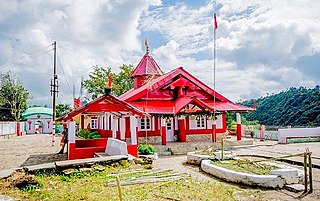
Meghalaya ; is a state in northeastern India. The population of Meghalaya as of 2016 is estimated to be 3,211,474. Meghalaya covers an area of approximately 22,430 square kilometres, with a length to breadth ratio of about 3:1.

Jowai is the headquarters of West Jaintia Hills district of the state of Meghalaya, India and is home to the Pnar, a sub-tribe of Hynniewtrep people. It is a scenic place located on a plateau surrounded on three sides by the Myntdu river bordering Bangladesh to the south. Due to its high altitude of 1365 m above sea level, Jowai experiences warm and pleasant summers with cool to chilly winters.
Evelyn Norah "Rani" Shullai is an educationalist and a pioneer of Girl Guiding in India. She has received numerous awards including the Silver Star from the Indian government and the Silver Elephant from the Bharat Scouts and Guides. Shullai is the second Padma Shri recipient in Meghalaya, given in 1977.
The Roman Catholic Diocese of Jowai is a diocese located in the city of Jowai in the Ecclesiastical province of Shillong in India. In a land area of 3,819 square kilometers, the diocesan territory covers the districts of East and West Jaintia Hills in Meghalaya.

Jaintia Hills Autonomous District Council (JHADC) is an autonomous district council in the state of Meghalaya in India. It is one of the three autonomous district councils within Meghalaya, and one of twenty-five autonomous regions of India. It was formed as the Jowai Autonomous District Council on 23 November 1964 from the Jowai Subdivision of the United Khasi-Jaintia Hills District – adopting its current name on 14 June 1973.

The Khelma or Khelma/Sakachep are one of the old Kuki tribes of Northeastern parts of India.

The Khasi and Jaintia Hills are a mountainous region that was mainly part of Assam and Meghalaya. The Assam Legislative Assembly This area is now part of the present Indian constitutive state of Meghalaya, which includes the present districts of East Jaintia Hills district, headquarter Khliehriat, West Jaintia Hills district, headquarter Jowai, East Khasi Hills district, headquarter Shillong, and West Khasi Hills district, headquarter Nongstoin.

Nohsngithiang Falls is a seven-segmented waterfall located 1 kilometre (0.62 mi) south of Mawsmai village in East Khasi Hills district in the Indian state of Meghalaya. The water falls from a height of 315 metres (1,033 ft) and has an average width of 70 metres (230 ft). making it one of the tallest waterfalls in India.
Vincent Kympat was the Roman Catholic bishop of the Roman Catholic Diocese of Jowai, India.
Pasyih , located at 25.4817°N 92.2882°E is a village in Laskein C.D. Block near Jowai in the West Jaintia Hills district of Meghalaya state of India.Pasyih is a part of three contiguous villages:
Myntdu River is one of the major water bodies in Jaintia Hills District, Meghalaya, locally known as 'ka Tawiar ka Takan' in the Pnar dialect. It is a blessing to the residents of the town of Jowai and adjacent places. Its abundant water is used to irrigate the Myntdu Valley, located on the outskirts of Jowai town.
Conversion from indigenous to Christianity began in the 19th century under the British era. In the 1830s, American Baptist Foreign Missionary Society had become active in Northeast to convert indigenous tribes to Christianity. Later, they were offered to expand and reach into Cherrapunji Meghalaya, but they lacked the resources to do so and declined. Welsh Presbyterian Mission took the offer and they began work at the Cherrapunji mission field. By the early 1900s, other Protestant denominations of Christianity were active in Meghalaya. The outbreak of World Wars forced the preachers to return home to Europe and America. It is during this period that Catholicism took root in Meghalaya and neighbouring region. In the 20th century, Union Christian College started operations at Barapani, Shillong. Currently, Presbyterians and Catholics are two most common Christian denominations found in Meghalaya.

West Jaintia Hills is an administrative District in the state of Meghalaya in India. The united district was created on 22 February 1972 and occupied an area of 3819 km2. It had a population of 270,352. The district is part of the Meghalaya subtropical forests ecoregion. With the bifurcation of the erstwhile Jaintia Hills District into East and West Jaintia Hills Districts, West Jaintia Hills District came into existence on 31 July 2012 with its headquarters at Jowai. Jowai is the host of all the heads of important governmental offices and establishments, educational institutions, hospitals, banking institutions, etc.

U Kiang Nangbah was a freedom fighter from Meghalaya who led an uprising against the British. He was hanged by the British publicly at Iawmusiang in Jowai town in West Jaintia Hills district on 30 December 1862. A postage stamp was issued by Government of India to commemorate him in 2001. A government college was also opened at Jowai in 1967 in his honour.
Jowai is one of the 60 assembly constituencies of Meghalaya, a north east state of India. This constituency falls under Shillong Lok Sabha constituency. Current MLA from this constituency is Wailadmiki Shylla of National People's Party.

Nongtalang is a small town located in West Jaintia Hills district, Meghalaya, India.

Thadlaskein Lake also ''Pung Sajar Nangli'' is man-made historical Lake in Meghalaya, India. It is located besides National Highway 6 by the side of a small village called Mukhla village which falls under West Jaintia Hills district Jowai. It is about 58 kilometres (36 mi) from the city of Shillong.

Hinduism is a minority religion in the Meghalaya state of India. Hindus constitute 12% of the population. Hinduism is a popular religion practice by Rabhas, Hajongs, Kochs, Rajbongshis, Mikirs, Bengalis, Nepalis, Biharis etc.









